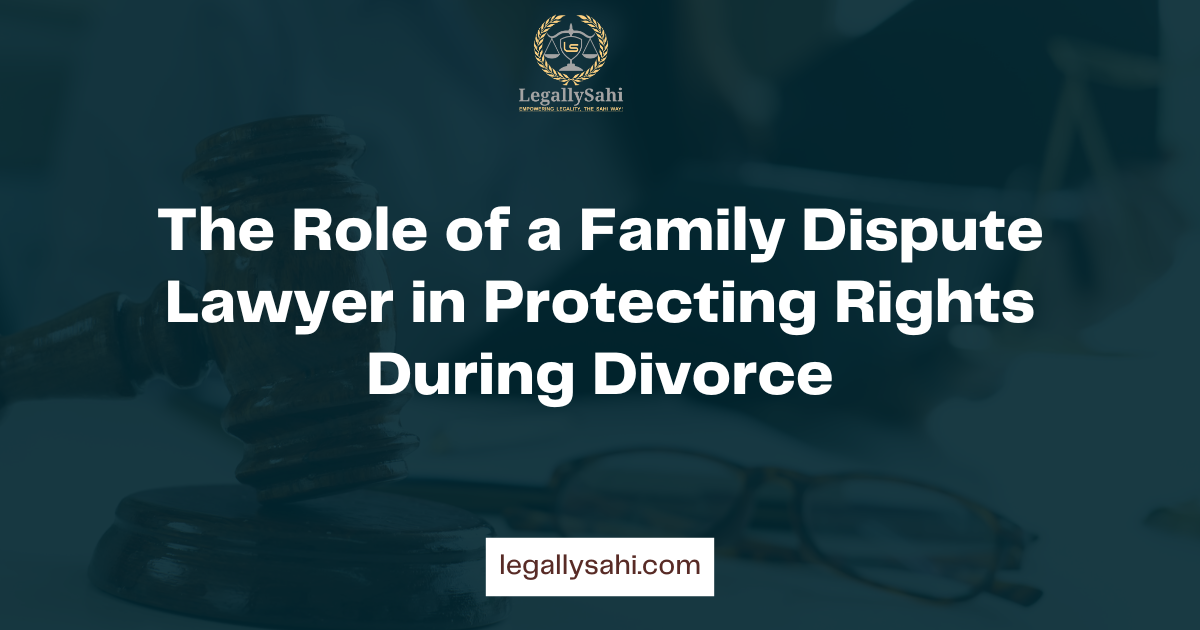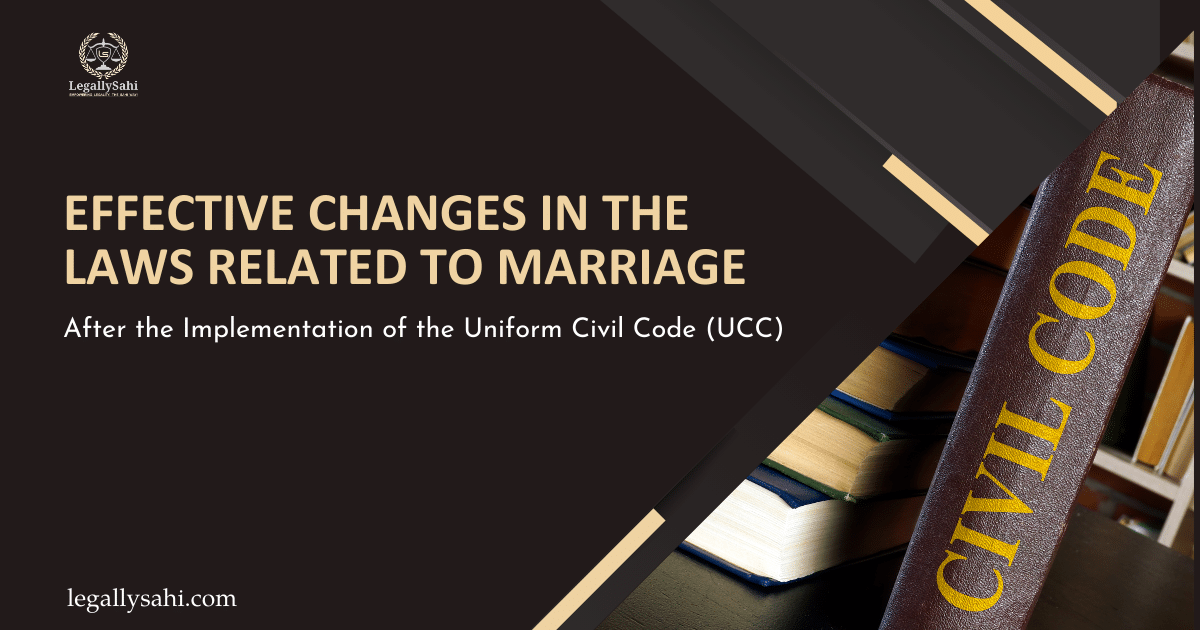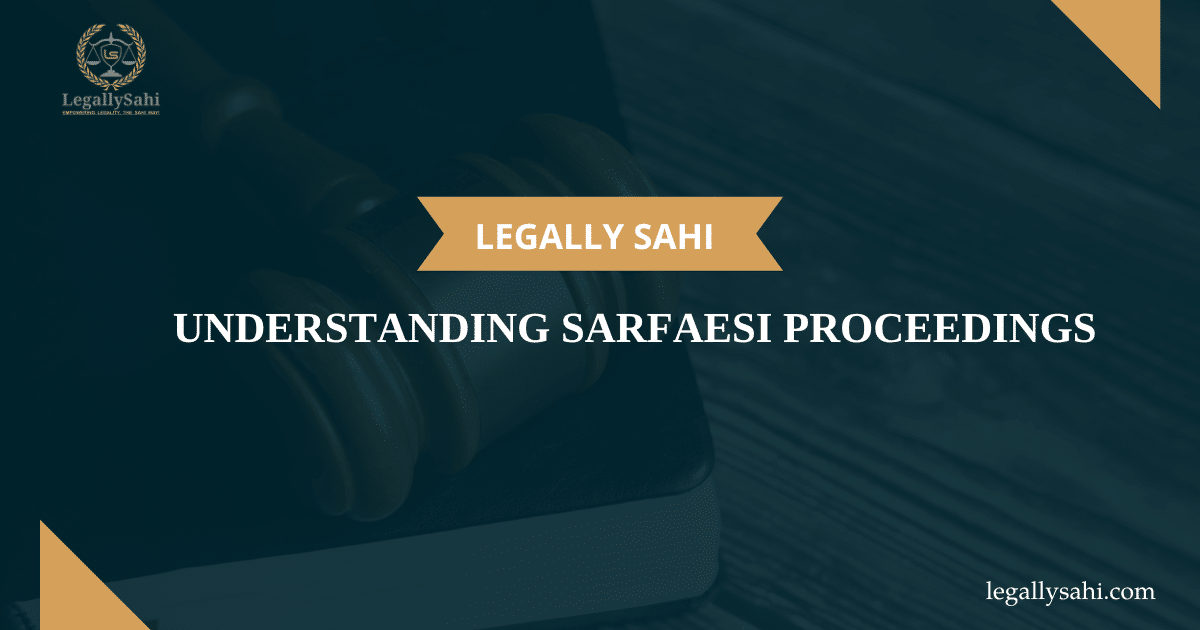Divorce is often a challenging and emotionally charged process that involves numerous legal complexities. Navigating these complexities while safeguarding your rights requires professional legal assistance. A family dispute lawyer plays a crucial role in guiding you through this difficult time, ensuring that your rights are protected and that you reach a fair settlement. This blog will explore the vital role of a family dispute lawyer in divorce proceedings and how they can help protect your interests.
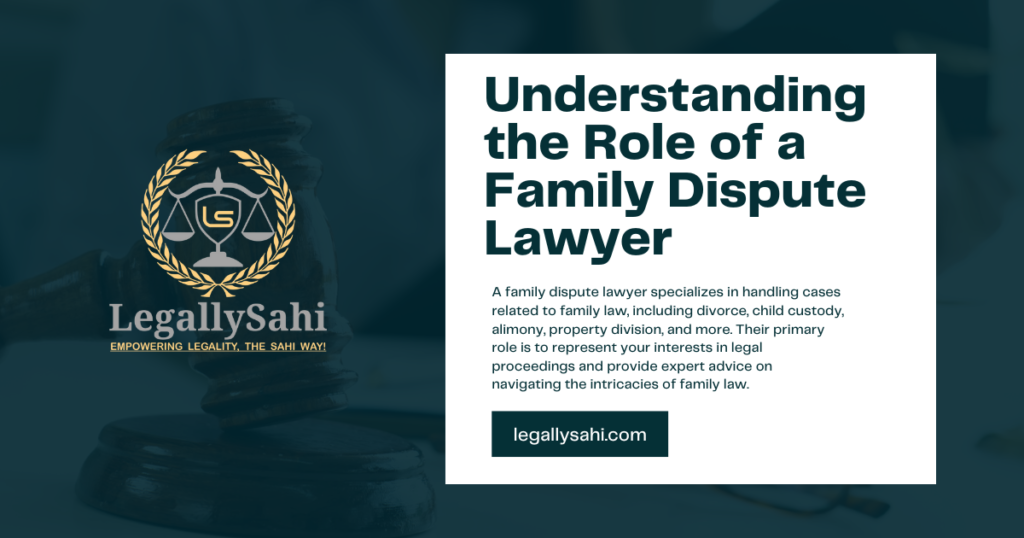
Understanding the Role of a Family Dispute Lawyer
A family dispute lawyer specializes in handling cases related to family law, including divorce, child custody, alimony, property division, and more. Their primary role is to represent your interests in legal proceedings and provide expert advice on navigating the intricacies of family law. Here’s how a family dispute lawyer can assist you during a divorce:
1. Legal Advice and Guidance
Divorce involves numerous legal issues that can be overwhelming without professional guidance. A family dispute lawyer provides clear and concise legal advice tailored to your specific situation. They help you understand your rights and obligations, ensuring you make informed decisions throughout the process.
2. Representation in Court
If your divorce case goes to court, having a skilled family dispute lawyer is essential. They will represent you in court, presenting your case effectively to the judge. Their experience and knowledge of family law can significantly influence the outcome of your case.
3. Negotiation and Mediation
Many divorce cases are resolved through negotiation or mediation rather than litigation. A family dispute lawyer will negotiate on your behalf, aiming to reach a fair settlement. They can also facilitate mediation sessions, helping both parties reach an agreement without the need for a contentious court battle.
4. Documentation and Paperwork
Divorce involves extensive documentation and paperwork, including filing petitions, drafting agreements, and submitting court forms. A family dispute lawyer ensures that all necessary documents are accurately prepared and timely filed, avoiding any procedural delays.
5. Protecting Your Rights
One of the primary roles of a family dispute lawyer is to protect your legal rights during the divorce process. This includes ensuring fair division of marital assets, securing appropriate alimony or spousal support, and safeguarding your parental rights in child custody and visitation matters.
Key Areas Where a Family Dispute Lawyer Can Help
1. Child Custody and Visitation
Child custody is frequently a source of intense disagreement during divorce proceedings. A family dispute attorney assists in mediating custody agreements that prioritize the child’s well-being while also safeguarding your rights as a parent. They can draft and review custody agreements and represent you in court if necessary.
2. Property Division
Equitable distribution of marital property is a critical issue in divorce proceedings. A family dispute lawyer will help identify and value marital assets, negotiate a fair division, and ensure that your property rights are protected. They can also address complex issues such as hidden assets or business valuations.
3. Alimony and Spousal Support
Determining appropriate spousal support can be complicated. A family dispute lawyer will advocate for a fair alimony arrangement, considering factors such as the length of the marriage, the earning capacity of each spouse, and the standard of living established during the marriage.
4. Child Support
Ensuring that child support arrangements are fair and adequate is essential for the well-being of your children. A family dispute lawyer will calculate child support obligations based on state guidelines and negotiate terms that reflect the best interests of the child.
5. Enforcement and Modification of Orders
Post-divorce, circumstances may change, necessitating modifications to custody, support, or visitation orders. A family dispute lawyer can help you request modifications or enforce existing orders if the other party fails to comply.
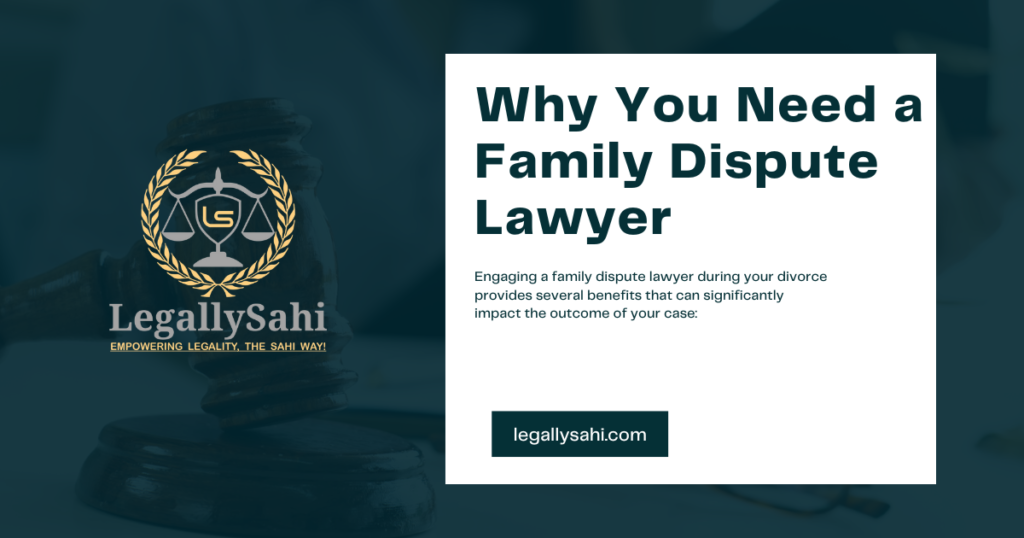
Why You Need a Family Dispute Lawyer
Engaging a family dispute lawyer during your divorce provides several benefits that can significantly impact the outcome of your case:
1. Expert Knowledge of Family Law
Family dispute lawyers have extensive knowledge of family law and stay updated on any changes in
legislation. Their expertise ensures that your case is handled according to the latest legal standards.
2. Objective Perspective
Divorce is an emotional process, and it’s easy to become overwhelmed. A family dispute lawyer provides
an objective perspective, helping you make rational decisions rather than emotional ones.
3. Efficient Resolution
Legal proceedings can be time-consuming. A family dispute lawyer helps streamline the process, ensuring
that your case progresses efficiently and without unnecessary delays.
4. Strategic Planning
Each divorce case is unique, and a family dispute lawyer will develop a personalized strategy to achieve
your goals. They will assess the strengths and weaknesses of your case and plan accordingly.
5. Peace of Mind
Knowing that a professional is handling your case provides peace of mind. You can focus on rebuilding
your life while your lawyer manages the legal complexities.
How to Choose the Right Family Dispute Lawyer
Selecting the right family dispute lawyer is crucial for a successful outcome. Here are some tips to help you choose the best lawyer for your case:
1. Experience and Expertise
Look for a lawyer with extensive experience in family law and a successful track record in handling
divorce cases. Specialization in family law indicates that the lawyer has the necessary expertise.
2. Reputation
Before selecting a lawyer, it’s crucial to assess their reputation. This can be done by examining feedback
and testimonials from past clients to gain insight into their performance and reliability.. A lawyer with
positive feedback and a good reputation is more likely to provide satisfactory service.
3. Communication Skills
Effective communication is essential in legal mattersSelect a lawyer who communicates effectively, pays
attention to your worries, and provides regular updates on the status of your case.
4. Accessibility
Ensure that the lawyer is accessible and responsive. You should be able to reach them easily when you have questions or need updates on your case.
5. Fees and Charges
Have an upfront discussion about the lawyer’s fees and make sure there are no hidden expenses.
Understand their billing structure and make sure it fits within your budget.
6. Personal Connection
Divorce is a personal matter, and it’s important to feel comfortable with your lawyer. Choose someone who makes you feel at ease and whom you can trust to handle your case with care.
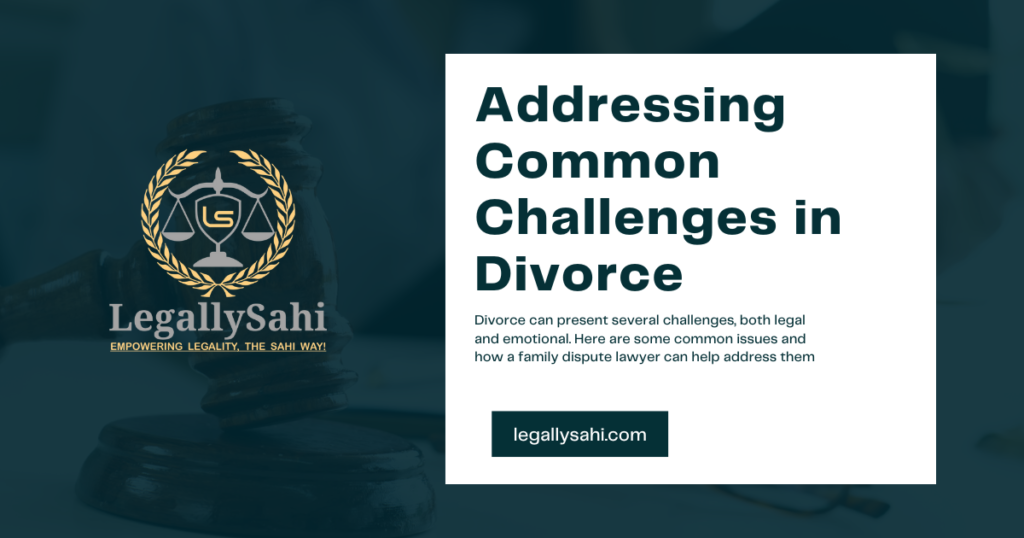
Addressing Common Challenges in Divorce
Divorce can present several challenges, both legal and emotional. Here are some common issues and how a family dispute lawyer can help address them:
1. Emotional Stress
The emotional toll of divorce can affect decision-making. A lawyer provides support and guidance, helping you focus on practical aspects while managing emotional stress.
2. Conflict and Disputes
High-conflict divorces can be particularly challenging. A lawyer can mediate disputes and work towards a
peaceful resolution, reducing the need for contentious court battles.
3. Financial Concerns
Financial stability is a major concern during divorce. A lawyer ensures that financial settlements are fair
and that your economic future is secure.
4. Child-Related Issues
Disputes over child custody and support can be distressing. A lawyer advocates for arrangements that
prioritize the best interests of the child and your parental rights.
5. Complex Legal Procedures
Navigating the legal system can be daunting. A lawyer handles all legal procedures, ensuring compliance
with court requirements and deadlines.
What to Do After Successful Divorce Proceedings: Next Steps
Once your divorce is finalized, there are several steps you should take to ensure a smooth transition
1.Update Legal Documents
Update your will, power of attorney, and any other legal documents to reflect your new status and wishes.
2. Change Beneficiary Designations
Review and update beneficiary designations on life insurance policies, retirement accounts, and other
financial instruments.
3. Review Financial Plans
Assess your financial situation and make necessary adjustments to your budget, savings, and investments
4. Seek Emotional Support
Consider counseling or support groups to help you cope with the emotional aftermath of divorce.
5. Focus on Personal Growth
Use this time to focus on personal growth and rebuilding your life. Pursue new interests, set goals, and
prioritize self-care.


